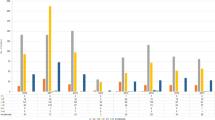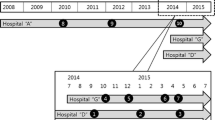Abstract.
The purpose of this study was to determine incidence of coagulase-negative staphylococci (CNS) bacteraemia and to characterise the epidemiology of isolates with reduced susceptibility to glycopeptides. CNS isolates from bloodstream infections were collected and characterised by determination of the species, analysis of antibiotic susceptibility, and restriction fragment length polymorphism using pulsed-field gel electrophoresis. The medical records of patients with positive cultures and the trends in glycopeptide use were reviewed to determine the effect of previous antibiotic treatment on the susceptibility profile of these organisms. The incidence of bacteraemia caused by CNS was 0.26 per 100 patients or 0.36 per 1,000 days of hospitalisation. According to genomic fingerprinting typing, 41 (67.2%) cases of bacteraemia were caused by a unique strain of CNS and 20 were caused by several strains. Nineteen of the 61 cases of bacteraemia studied were caused by an isolate with decreased susceptibility to teicoplanin. Genomic DNA analysis of the 90 CNS isolates recovered from the 61 cases of bacteraemia generated 50 unique profiles (1 isolate per major PFGE pattern) and 13 multiple profiles (several isolates per major PFGE pattern). Neither decreased susceptibility of an isolate to teicoplanin nor hospital acquisition was associated with a multiple profile. There was a significant correlation between the incidence of bacteraemia caused by CNS with decreased susceptibility to teicoplanin and glycopeptide use at the unit level but not in individual patients. Cross-transmission did not play an important role in the dissemination of CNS with decreased susceptibility to teicoplanin, thus strains probably become resistant as a result of antibiotic pressure. Prudent use of glycopeptides is necessary to minimise the spread of resistance to these agents.
Similar content being viewed by others
Author information
Authors and Affiliations
Additional information
Electronic Publication
Rights and permissions
About this article
Cite this article
Boisson, .K., Thouverez, .M., Talon, .D. et al. Characterisation of Coagulase-Negative Staphylococci Isolated from Blood Infections: Incidence, Susceptibility to Glycopeptides, and Molecular Epidemiology. Eur J Clin Microbiol Infect Dis 21, 660–665 (2002). https://doi.org/10.1007/s10096-002-0799-9
Issue Date:
DOI: https://doi.org/10.1007/s10096-002-0799-9




